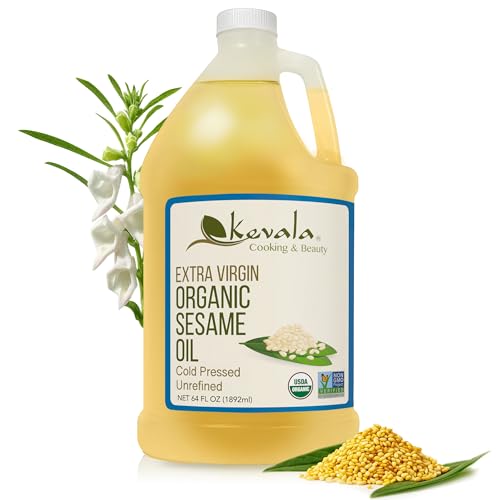



Sesame oil is a popular ingredient in many Asian cuisines and is known for its distinct nutty flavor. Whether you use it for stir-frying, dressing salads, or enhancing the flavor of your dishes, sesame oil is a versatile and delicious addition to your pantry.
However, like other oils, sesame oil can become rancid over time, especially if not stored properly. To maintain its freshness and extend its shelf life, it is recommended to store sesame oil in the refrigerator.
So, how long can you keep sesame oil in the refrigerator? The answer depends on several factors, such as the quality of the oil, how it is stored, and the temperature of your refrigerator.
Generally, unopened sesame oil can last up to two years when stored in the refrigerator. However, once opened, it is best to use the oil within six months to a year for the best flavor and quality.
Proper storage is key to preserving the freshness of sesame oil. Make sure to keep the bottle tightly sealed to prevent air and moisture from entering, as they can accelerate the deterioration of the oil. Additionally, store the sesame oil away from direct sunlight and heat sources, as they can also affect its quality.
In conclusion, sesame oil can be kept in the refrigerator for up to two years if unopened, and six months to a year once opened. Proper storage is important to maintain the flavor and quality of the oil, so make sure to keep it tightly sealed and away from sunlight and heat.
Storage Life of Sesame Oil
Sesame oil, a popular cooking oil known for its distinctive nutty flavor, should be stored properly to maintain its freshness and quality. By following the proper storage guidelines, you can extend the shelf life of sesame oil and ensure it remains safe for consumption.
Refrigeration
Sesame oil can be refrigerated to prolong its shelf life. It is recommended to store unopened sesame oil bottles in the refrigerator, as the cool temperature helps slow down the oxidation process, which can cause the oil to go rancid. Once opened, make sure to tightly seal the bottle and place it in the refrigerator to retain its freshness.
Storage Duration
The storage duration of sesame oil depends on various factors, including the quality of the oil, exposure to light, and temperature. Generally, unopened bottles of sesame oil can be stored in the refrigerator for up to 2 years. However, it is important to check the expiration date on the bottle for specific guidelines.
Once opened, sesame oil should be used within 6-12 months for optimal flavor and quality. Over time, the oil may start to lose its aroma and taste, so it is advisable to use it before it becomes rancid.
Signs of Spoilage
It is essential to check for any signs of spoilage before using sesame oil, especially if it has been stored for an extended period. Signs of spoiled sesame oil include a rancid smell or taste, a cloudy or moldy appearance, or the presence of sediment at the bottom of the bottle. If any of these signs are detected, it is advisable to discard the oil to avoid any health risks.
| Storage Method | Unopened | Opened |
|---|---|---|
| Refrigeration | Up to 2 years | 6-12 months |
Proper storage of sesame oil is essential to maintain its quality and prevent spoilage. By storing it in a cool, dark place or in the refrigerator, you can prolong its shelf life and enjoy its distinctive flavor in your culinary creations for an extended period.
Factors Affecting Shelf Life
Several factors can affect the shelf life of sesame oil and determine how long it can be stored in the refrigerator. These factors include:
Quality of the oil: The quality of the sesame oil plays a significant role in determining its shelf life. High-quality, unrefined sesame oil tends to have a longer shelf life compared to lower quality, refined versions.
Exposure to light and heat: Sesame oil should be stored in a cool, dark place, away from direct sunlight and heat sources. Exposure to light and heat can accelerate the oil’s oxidation process and negatively impact its shelf life.
Storage conditions: Proper storage conditions are essential for extending the shelf life of sesame oil. Refrigerating the oil can help slow down the oxidation process and prevent rancidity. It is important to ensure the oil is stored in a tightly sealed, airtight container to minimize exposure to air and moisture.
Note: While sesame oil can be refrigerated to prolong its shelf life, it is important to check for signs of spoilage before using it, such as a foul smell, unusual appearance, or an off taste. If any of these signs are present, it is best to discard the oil to ensure food safety.
Proper Storage of Sesame Oil
Sesame oil is a popular ingredient in many Asian cuisines and is known for its distinctive nutty flavor. To ensure its quality and extend its shelf life, proper storage is crucial. Here are some tips to help you store sesame oil correctly:
1. Choose the Right Container
When purchasing sesame oil, opt for a bottle made of dark-colored glass or non-reactive material such as stainless steel. This helps protect the oil from exposure to light and air, which can cause oxidation and spoilage.
2. Store in a Cool, Dark Place
Sesame oil should be stored in a cool and dark place, away from direct sunlight and sources of heat. Avoid storing it near the stove or any other heat-emitting appliances. The ideal storage temperature is between 50°F and 70°F (10°C and 21°C).
3. Refrigeration
While sesame oil doesn’t need to be refrigerated, keeping it in the refrigerator can help extend its shelf life. The cool temperature of the fridge helps slow down the oxidation process, keeping the oil fresh for a longer period. However, avoid storing it near strong-smelling foods as sesame oil can easily absorb odors.
Remember to always seal the bottle tightly after each use to prevent air and moisture from entering.
By following these storage guidelines, you can enjoy the full flavor of your sesame oil for an extended period.
Signs of Spoiled Sesame Oil
As with any cooking oil, sesame oil can spoil over time, especially if not stored properly. Here are some signs that your sesame oil may have gone bad:
- Unpleasant Odor: One of the first signs of spoiled sesame oil is a rancid or off-putting smell. If the oil smells sour, stale, or fishy, it is likely no longer good to use.
- Off Color: Sesame oil should have a clear, golden color. If the oil appears cloudy or has developed a dark or brown color, it may be spoiled.
- Strange Taste: Spoiled sesame oil may have a bitter or unpleasant taste. If the oil tastes off or lacks its characteristic nutty flavor, it’s best to discard it.
- Visible Sediment: If you notice any sediment or particles at the bottom of the sesame oil bottle, it could be a sign of spoilage. Discard the oil if you see any visible contaminants.
Remember, consuming spoiled oil can lead to foodborne illnesses, so it’s important to be cautious and use your senses to determine if the sesame oil has gone bad. When in doubt, it’s always safer to replace the oil rather than risk food poisoning.
Tips for Extending Shelf Life
Proper storage and care can help extend the shelf life of sesame oil. Here are some tips:
| Keep it refrigerated: | Sesame oil should always be stored in the refrigerator to slow down the oxidation process. |
| Use an airtight container: | Ensure that the sesame oil is stored in a container with a tight-fitting lid to prevent exposure to air, which can accelerate spoilage. |
| Avoid direct sunlight: | Keep the sesame oil away from direct sunlight or other sources of heat, as they can cause the oil to spoil more quickly. |
| Minimize contact with water: | Avoid introducing any water or moisture into the bottle, as it can promote the growth of bacteria and shorten the shelf life. |
| Check for foul odors or flavors: | Regularly check the smell and taste of the sesame oil. If it has a rancid or off-putting odor, it is best to discard it. |
| Don’t store near strong-smelling foods: | Sesame oil can easily absorb strong odors from other foods, so it’s important to store it away from pungent ingredients. |
By following these tips, you can prolong the shelf life of your sesame oil and ensure that it remains fresh and flavorful for longer.
Creative Ways to Use Expired Sesame Oil
Sesame oil is commonly used in Asian cuisine for its rich, nutty flavor. However, like any other food product, it has a limited shelf life, and using expired sesame oil may not be safe for consumption. Instead of throwing it away, here are some creative ways you can still utilize expired sesame oil:
1. DIY Skincare
Expired sesame oil can still be used for skincare purposes. Its antioxidant properties make it beneficial for nourishing and moisturizing the skin. You can mix it with other natural ingredients like honey or aloe vera to create your own homemade face mask or body lotion.
2. Wood Furniture Polish
Instead of using chemical-filled furniture polishes, you can use expired sesame oil to polish your wooden furniture. Apply a small amount of oil onto a soft cloth and rub it onto the surface of your furniture. It will bring out a natural shine and help protect the wood.
3. Natural Lubricant
If you’re in a pinch and need a lubricant for squeaky hinges or other household uses, expired sesame oil can come in handy. Its viscosity makes it a good alternative to traditional lubricants.
Remember to always check the quality and smell of the expired sesame oil before using it for any purpose. If it smells rancid or has an off-putting odor, it’s best to dispose of it properly.
| Warning: | Using expired sesame oil for consumption may lead to foodborne illnesses. It is always safer to dispose of expired food items properly. |
|---|
FAQ
Can you keep sesame oil in the refrigerator?
Yes, you can keep sesame oil in the refrigerator.
How long can you store sesame oil in the refrigerator?
You can store sesame oil in the refrigerator for up to 2 years.
What happens if you keep sesame oil in the refrigerator for too long?
If you keep sesame oil in the refrigerator for too long, it may become rancid and develop an unpleasant odor and taste.







